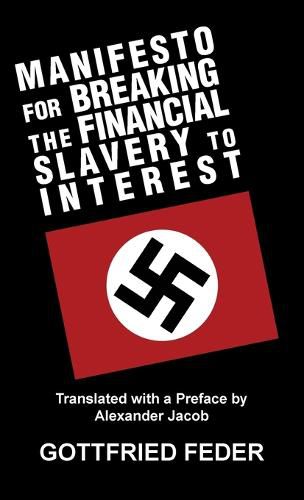Readings Newsletter
Become a Readings Member to make your shopping experience even easier.
Sign in or sign up for free!
You’re not far away from qualifying for FREE standard shipping within Australia
You’ve qualified for FREE standard shipping within Australia
The cart is loading…






This title is printed to order. This book may have been self-published. If so, we cannot guarantee the quality of the content. In the main most books will have gone through the editing process however some may not. We therefore suggest that you be aware of this before ordering this book. If in doubt check either the author or publisher’s details as we are unable to accept any returns unless they are faulty. Please contact us if you have any questions.
Gottfried Feder’s Manifesto For Breaking The Financial Slavery To Interest is one of a series of three books by the important, albeit now obscure German campaigner against parasitic debt-finance-capitalism.
It was Feder who gave opposition to debt-finance and a demand for a new banking system a technical foundation without which the National Socialist economic and financial policies might not have gone beyond a vague enmity towards capitalism because of its identification with Jews.
Feder attempted to interest the Munich Soviet in his ideas for banking reform, but in good Marxist fashion, this fell on deaf ears. It was left to the embryonic National Socialist group to see in Feder’s ideas the means of achieving both freedom from debt-bondage and the means by which the state could assume its prime duty to issue the community’s own credit, limited only by its productivity and creativity.
Even though, as the Reich progressed, Feder, like many other early idealists, was relegated to minor rank within the Third Reich, his fundamental ideas provided the basis for Germany’s socio-economic revival while the rest of the world wallowed in Depression. In this respect Feder is Germany’s equivalent to New Zealand’s John A. Lee, Australia’s Jack Lang, U.S.A.‘s Father Charles Coughlin, and Britain’s C. H. Douglas and Arthur Kitson. Feder deserves an honoured place amongst the early fighters against usury-capital, a subject which continues to be, perhaps more than ever, of vital relevance to the world.
$9.00 standard shipping within Australia
FREE standard shipping within Australia for orders over $100.00
Express & International shipping calculated at checkout
This title is printed to order. This book may have been self-published. If so, we cannot guarantee the quality of the content. In the main most books will have gone through the editing process however some may not. We therefore suggest that you be aware of this before ordering this book. If in doubt check either the author or publisher’s details as we are unable to accept any returns unless they are faulty. Please contact us if you have any questions.
Gottfried Feder’s Manifesto For Breaking The Financial Slavery To Interest is one of a series of three books by the important, albeit now obscure German campaigner against parasitic debt-finance-capitalism.
It was Feder who gave opposition to debt-finance and a demand for a new banking system a technical foundation without which the National Socialist economic and financial policies might not have gone beyond a vague enmity towards capitalism because of its identification with Jews.
Feder attempted to interest the Munich Soviet in his ideas for banking reform, but in good Marxist fashion, this fell on deaf ears. It was left to the embryonic National Socialist group to see in Feder’s ideas the means of achieving both freedom from debt-bondage and the means by which the state could assume its prime duty to issue the community’s own credit, limited only by its productivity and creativity.
Even though, as the Reich progressed, Feder, like many other early idealists, was relegated to minor rank within the Third Reich, his fundamental ideas provided the basis for Germany’s socio-economic revival while the rest of the world wallowed in Depression. In this respect Feder is Germany’s equivalent to New Zealand’s John A. Lee, Australia’s Jack Lang, U.S.A.‘s Father Charles Coughlin, and Britain’s C. H. Douglas and Arthur Kitson. Feder deserves an honoured place amongst the early fighters against usury-capital, a subject which continues to be, perhaps more than ever, of vital relevance to the world.